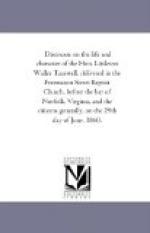There was a branch of the old Bank of the United States, whose entire capital, distributed over the Union, was only ten millions. There was as yet, and fourteen years later, no daily paper. The Herald, then in its ninth year, was published three times a week, and was the organ of the democratic party. It was not until two years later that the Ledger appeared in the field, under the lead of that able champion John Cowper, and gave the federal flag to the breeze. More than fourteen years were to elapse before a daily paper was established. The equinoctial storms sadly worried our fathers. From the imperfect filling in of the streets and wharves, the tides rose high; and then, if we would keep out of sight St. Mark’s, the Rialto, and the palaces of merchant princes, Norfolk was another edition of Venice. The canoe was our gondola, and “yo heave oh” were our echoes of Tasso. A bold stream, that would float a vessel of one hundred tons, cut Granby and Bank streets in two, and just halted on the west side of Church, where it was almost met by another furious stream from Newton’s Creek. At Town Bridge a torrent raged that was not to be crossed until the tide fell. Freemason, between Brewer and Granby, presented a sea deep enough to float a vessel of one hundred tons. Our Rialto on Granby was not erected till eighteen or twenty years later; and I remember our fathers were so proud of it, that they invited strangers to see it. It took, for a time, the shine from the Navy Yard. The health of the town ranked the lowest. The tombstones in old St. Paul’s tell of the number




